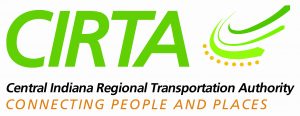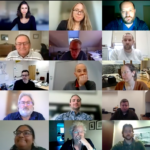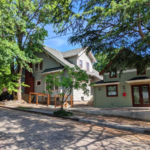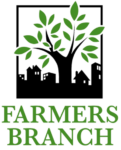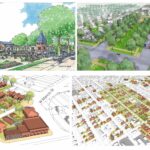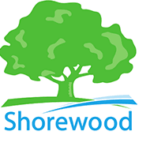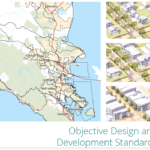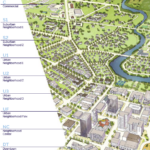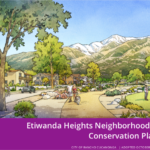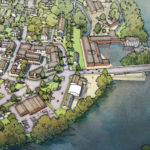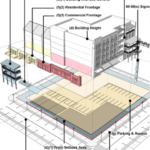FBC 101: The ABCs of Form-Based Codes – Anderson, IN October 28
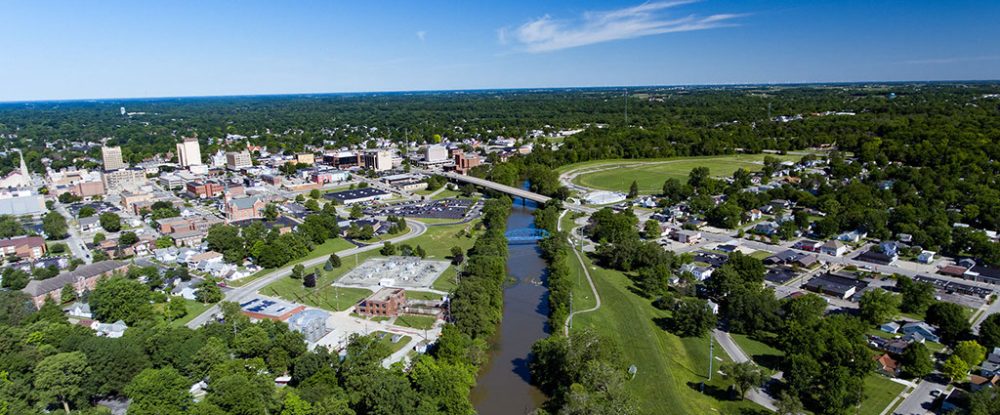
Image: Madison County Council of Governments
Summary
FBC 101: The ABCs of Form-Based Codes
Monday, October 28
Anderson Museum of Fine Art
32 West 10th Street
Anderson, IN 46016
Click HERE for a list of lodging, dining, and parking recommendations.
Eligible for 8 AICP CM
FBC101 is an intensive one-day class, in which participants learn how form-based codes are essentially different from conventional land use regulation and how they have evolved to solve many of the problems created by conventional zoning. The course provides an overview of the process of creating a form-based code, moving from an initial place-based community vision to an adopted code and beyond. Instructors combine lecture and classroom discussion with a hands-on exercise in observing community built form and shaping public space. Participants also learn about common misconceptions about form-based codes and the legal basis for form-based codes. This class is prerequisite for FBC 201 (urban design) and FBC 301 (code implementation). Participants who attend all three courses receive a certificate of completion from FBCI.
Click the tabs above to see agenda and instructors.
Lodging
Click HERE for a full list of lodging and dining recommendations.
2400 E 64th Street
Anderson, IN 46013
2312 Hampton Drive
Anderson, IN 46013
6720 S Scatterfield Road
Anderson, IN 46013
Agenda
The following is a final agenda.
8:30 – 9:00 AM Registration and Light Breakfast
9:00 – 9:15 AM Welcome and Introductions — All Instructors
Instructors will introduce themselves and the Form-Based Codes Institute and provide background on why communities may decide to use form-based codes. Participants will introduce themselves comment on why they are attending the class and what they hope to learn.
9:15 – 10:15 AM Form-Based Code Principles and Components: A Tool for Shaping Community Form and Character and Smarter Growth — Leslie Oberholtzer
The session will provide an overview of the differences between form-based codes and conventional zoning; the most common applications for form-based codes; common barriers to traditional urbanism; and basic principles of urban form. The session will highlight the need for zoning reform and how form-based codes have become the paradigm for putting form first and relegating use to secondary status.
10:15 – 11:00 AM Legal Aspects of Form-Based Codes — Susan Henderson
A broad understanding of applicable law is essential when adopting a form-based code. This session will provide an overview of some of the general principles for regulatory amendments; review some important considerations for the process of adopting a code; and present ideas for how to minimize the potential for legal challenges.
11:00 – 11:15 AM Break
11:15 AM – 12:00 PM Local Examples of Form-Based Codes — Leslie Oberholtzer
Form-based codes have gained positive momentum in Indiana as a legitimate alternative to conventional zoning. Case studies of form-based codes in Indiana municipalities will be shared and discussed.
12:00 – 12:45 PM Lunch Provided by MCCOG
12:45 – 1:30 PM Common Misunderstanding about Form-Based Codes — Susan Henderson
In this session, the instructors will address common misunderstandings about form-based coding and how to address them. Topics will include: complexity and flexibility in form-based codes, the role of consultants in drafting a code, regulation of uses in an FBC, guidelines versus regulations, the potential for displacement, and the degree to which architecture and design can be regulated under an FBC.
1:30 – 3:15 PM Documentation Exercise: Learning How to Look — All Instructors
In this exercise, participants will learn the role of quality built places in defining the DNA for vision plans and form-based codes. Participants will observe, document, and discuss different contexts and levels of urbanism via an instructor-led walking tour in Anderson. This documentation of elements such as streets, frontages, setbacks/build-to lines, and building forms become the foundation of a form-based code.
3:15 – 3:30 PM Break
3:30 – 4:15 PM Getting Ready for a Form-Based Code — Susan Henderson
Form-based codes are a new concept for many communities and local planners often need to build understanding and support before drafting and adopting a new code. Using case studies from their own experience, the instructors will speak about specific steps local planners have taken to prepare citizens, political leaders and their own staff for the transition to an FBC. This session will conclude with a summary of technical resources that are available to communities wishing to embark on a form-based code.
4:15 – 4:45 PM Lessons Learned and Q&A — All Instructors
4:45 PM Adjourn
Instructors
FBCI draws upon national experts, including urban designers and planners with broad experience in all aspects of form-based coding.
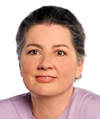 Susan Henderson is a founding Principal of PlaceMakers, LLC. She is Director of Coding and Design and oversees PlaceMakers’ design services, including Planning and Zoning. Susan graduated from Ball State University in 1985 with degrees in Architecture and Environmental Design and a minor in Honors Studies. She moved to Austin, TX to begin her career in architecture and planning. In 1996 Susan began to work with Mouzon & Associates in Huntsville, Alabama. A passion for vernacular architecture within the realm of walkable urbanism led her to co-found PlaceMakers, LLC as a vehicle to pursue this interest. For the last 13 years, the firm has led local governments and private developers in the pursuit of livable, equitable, sustainable communities.An active member of the Congress for the New Urbanism, Susan is a participant in the CNU’s Charter Councils and Project for Code Reform. She serves on the Form-Based Codes Institute’s Steering Committee and is a founding board member of the Transect Codes Council. Susan is a member of the American Institute of Architects and is a LEED-AP.
Susan Henderson is a founding Principal of PlaceMakers, LLC. She is Director of Coding and Design and oversees PlaceMakers’ design services, including Planning and Zoning. Susan graduated from Ball State University in 1985 with degrees in Architecture and Environmental Design and a minor in Honors Studies. She moved to Austin, TX to begin her career in architecture and planning. In 1996 Susan began to work with Mouzon & Associates in Huntsville, Alabama. A passion for vernacular architecture within the realm of walkable urbanism led her to co-found PlaceMakers, LLC as a vehicle to pursue this interest. For the last 13 years, the firm has led local governments and private developers in the pursuit of livable, equitable, sustainable communities.An active member of the Congress for the New Urbanism, Susan is a participant in the CNU’s Charter Councils and Project for Code Reform. She serves on the Form-Based Codes Institute’s Steering Committee and is a founding board member of the Transect Codes Council. Susan is a member of the American Institute of Architects and is a LEED-AP.
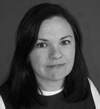 Leslie Oberholtzer is a principal and Director of Planning at CodaMetrics, a boutique planning lab in Chicago, Illinois. With over 25 years experience in urban design and smart growth planning, she works to promote sustainable development through the availability of alternative transportation and housing choices, the development of valuable places, and the preservation of community traditions. In addition to being a registered landscape architect and a certified planner, she is National Charrette Institute (NCI) certified and a LEED Associated Professional. Over the past 12 years, Leslie has developed over twenty-five neighborhood and full city codes for communities across the country. Recently, her work has focused on the research and development of form-based codes for Transit Oriented Development (TOD) nodes, corridors, and neighborhoods. Sustainability is at the core of the work Leslie produces not only through a focus on walkable and transit-served places, but also through the development of alternative energy, conservation area, and tree preservation ordinances. She also currently serves on the Location and Planning Technical Advisory Group for the US Green Building Council and the Star Community Index Technical Advisory Group, both cutting edge tools for sustainability at all scales of community.
Leslie Oberholtzer is a principal and Director of Planning at CodaMetrics, a boutique planning lab in Chicago, Illinois. With over 25 years experience in urban design and smart growth planning, she works to promote sustainable development through the availability of alternative transportation and housing choices, the development of valuable places, and the preservation of community traditions. In addition to being a registered landscape architect and a certified planner, she is National Charrette Institute (NCI) certified and a LEED Associated Professional. Over the past 12 years, Leslie has developed over twenty-five neighborhood and full city codes for communities across the country. Recently, her work has focused on the research and development of form-based codes for Transit Oriented Development (TOD) nodes, corridors, and neighborhoods. Sustainability is at the core of the work Leslie produces not only through a focus on walkable and transit-served places, but also through the development of alternative energy, conservation area, and tree preservation ordinances. She also currently serves on the Location and Planning Technical Advisory Group for the US Green Building Council and the Star Community Index Technical Advisory Group, both cutting edge tools for sustainability at all scales of community.Registration Fees
MCCOG Members: Please insert discount code, provided by Jerrold Bridges, at check out
In-State: $90*
Out-of-State Public Sector: $275
Out-of-State Private Sector: $325
*Reduced rate made possible by the generous sponsorship from Madison County Council of Governments.
We accept Visa, MasterCard, and Discover.
Register now!
ONLINE REGISTRATION DEADLINE: 10/24 (day-of registration available)
Thank you to our sponsors:
Thank you to our marketing partners:


